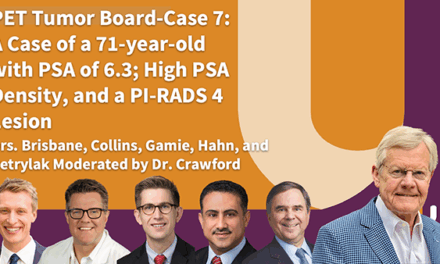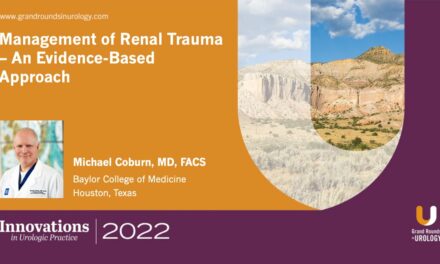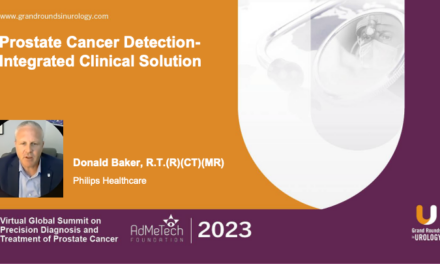Isaac Y. Kim, MD, PhD, MBA, presented “Cytoreductive Radical Prostatectomy – Is the Cat Already Out of the Bag? Current Status and Future” at the 27th Annual Innovations in Urologic Practice conference on September 22nd, 2023.
How to cite: Kim, Isaac K. “Cytoreductive Radical Prostatectomy – Is the Cat Already Out of the Bag? Current Status and Future.” September 2023. Accessed Jan 2026. https://grandroundsinurology.com/cytoreductive-radical-prostatectomy-is-the-cat-already-out-of-the-bag-current-status-and-futurel/
Cytoreductive Radical Prostatectomy – Is the Cat Already Out of the Bag? Current Status and Future – Summary
Isaac Y. Kim, MD, PhD, MBA, discusses cytoreductive radical prostatectomy (CRP). Despite advancements, the overall survival rate for metastatic prostate cancer (the incidence of which is rising in the U.S.) has only increased by four months since 2000. Dr. Kim cites the need for a paradigm change and posits that CRP may increase survival.
Dr. Kim describes a Phase I study on CRP showing a major complication rate of six percent as well as potential oncologic benefits. He cites a pilot study on patients receiving CRP and systemic therapy with some patients having durable responses long-term after CRP. Dr. Kim summarizes key lessons from the phase-one study, that CRP is feasible but difficult and the oncological outcome is promising, with three potentially different oncologic responses to CRP, with some patients experiencing PSA nadir <0.2 ng/ml, PSA decline but nadir remains 20.2 ng/ml, or disease progression.
Dr. Kim turns to the SIMCAP (Surgery in Metastatic Carcinoma of Prostate) Phase-II.5 study with the hypothesis being that CRP will render systemic therapy more effective and enhance quality of life in men with metastatic prostate cancer. He reviews endpoints, inclusion criteria, and study design and explains the study is a 1:1 randomization of surgery and systemic therapy vs. systemic therapy alone.
Dr. Kim emphasizes the study’s scientific value in addition to the study’s clinical value, providing access to biospecimens early in the treatment cycle. He compares the SIMCAP and SWOG clinical trial S1802, explaining that SIMCAP is purely focused on surgery and doesn’t include radiation and SIMCAP will have initial data more quickly than SWOG S1802. Dr. Kim summarizes by emphasizing CRP is safe and feasible, with a promising but uncertain therapeutic value, and the phase-two result on efficacy and quality of life is expected in two to four years.
About The 27th Annual Innovations in Urologic Practice:
Presented by co-chairs Mohit Khera, MD, MBA, MPH, and Michael Coburn, MD, FACS, the Innovations in Urologic Practice conference provides a detailed review and commentary on multiple genitourinary and urologic diseases. Among the featured oncological topics are bladder cancer and immunotherapies, as well as upper tract cancer management, prostate cancer, including state-of-the-art imaging, focal therapy, and MRI. Experts also discuss new tools and techniques for nephrectomy and treating advanced renal cell carcinoma. In terms of general urological approaches, the conference also includes pelvic reconstruction and trauma; men’s health topics like male infertility, andrology, and sexual dysfunction; OAB and voiding dysfunctions; and ways to diagnose and treat infections in the urology patient.
For further educational activities from this conference, visit our collection page.
ABOUT THE AUTHOR
Dr. Isaac Kim is a urologic oncologist and surgeon who specializes in the treatment, management, and prevention of prostate cancer, with the goal of helping patients navigate and better understand their disease. He has expertise in minimally invasive robotic surgery and has completed more than 2,100 robotic surgeries for prostate cancer. Dr. Kim's surgical focus has been on advanced and metastatic prostate cancer, as well as recurrent disease after radiation. Dr. Kim’s clinical research is focused on mechanisms of treatment resistance and specifically immunosuppressive factors produced by prostate cancer cells. He also has a strong interest in inflammation in prostate cancer and the role of surgery in men with advanced or metastatic prostate cancer.




